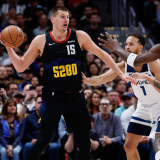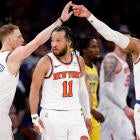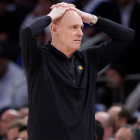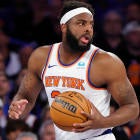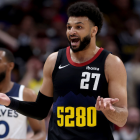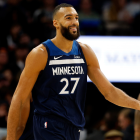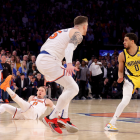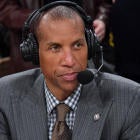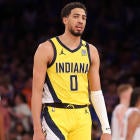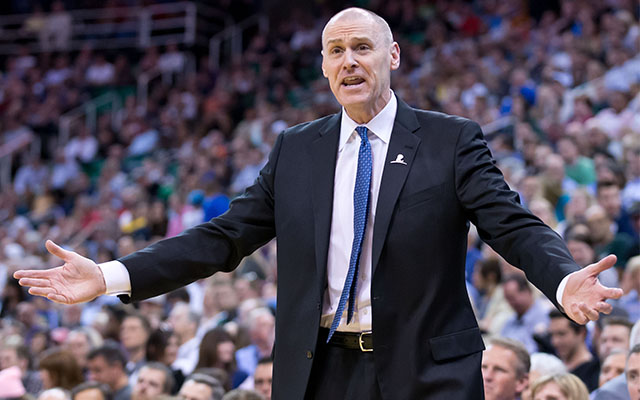
With the NBA playoffs beginning, there will be constant video montages honoring legends of the game. The history of the league is honored as the time of heroes plays out. This is a player's league and the greatest moments are etched in stone by those men that take the court.
But on the sideline, in adjustment strategies and motivational tactics, another game plays out between the coaches. It's possible for the NBA to be a player's league, and for the coaches to be under-appreciated at the same time. You know the great ones when you see them. Auerbach. Jackson. Popovich.
A name that increasingly rises in modern context is that of Mavericks coach Rick Carlisle. Carlisle's not just the coach to take Detroit to the precipice in the mid-00's before being let go in favor of Larry Brown, or the coach to have put the Pacers in position to contend before the madness of the Malice at the Palace. Nor is he just a former member of the 1986 NBA champion Boston Celtics, or the coach of the 2011 NBA champion Dallas Mavericks. He's also a leader in the profession, in the self-described fraternity of professional basketball coaches.
Within that charge, there's a name that rises for Carlisle, that comes with a great amount of respect and a frustration over the Basketball Hall of Fame's neglect of.
Bill Fitch coached 25 years in the NBA. He took the 1981 Boston Celtics to the NBA title, and the 1986 Rockets to the NBA Finals. He took his teams to the playoffs 13 times throughout the years, bringing five franchises from the lottery to the postseason. He coached some of the greatest players to ever play the game including Larry Bird, Robert Parish, and Hakeem Olajuwon.
Fitch was also, as some have described hime, "a huge pain in the ass." A hounding disciplinarian and compulsive detail-oriented obsessor, Fitch both pioneered the use of video as a scouting and teaching tool, and alienated his players, eventually resigning two years after winning a title with the Celtics. When the guys back in the 80's think that you were too rough, you can imagine how Fitch would be welcomed today.
But still, there's the impact he left on the league. He coached Phil Jackson in college. Rudy Tomjanovich learned under him, eventually taking over in Houston and winning two titles. And in the early 90's he took on an assistant coach who played for the Celtics after Fitch's time ended. In 2013, that coach presented him with the Chuck Daly Lifetime Achievement Award. Despite his accomplishments, despite the backing of the Coaches' Association, and despite his nomination, Fitch has not been selected to the Hall of Fame.
And that former assistant, current head of the Coaches' Association, and Dallas Mavericks coach Rick Carlisle isn't satisfied with that result.
Carlisle spoke with CBSSports.com last week on why Fitch belongs in the Hall of Fame, on the basketball gods, and preparing for the playoffs.
CBSSports.com: First I just wanted to get your reaction as head of the NBA Coaches' Association to the Hall's decision not to induct Bill Fitch again this year.
Rick Carlisle, coach, Dallas Mavericks: Well, we're disappointed that Bill Fitch didn't get inducted this year. We know that we need to continue to educate everyone on Coach Fitch's accomplishments, because they are unique.
He's third all time in games coached with over 2500. He took five different franchises to deep lottery to either championships, Finals, Conference Finals, or playoff success. When you take on those kinds of challenges, you're going to have more losses.
His coaching record doesn't shine as bright as some other people that are in (ed note: Fitch has a career .460 win percentage), but with over 25 years of longevity and some of the things he did to change the game, for example, he was one of the early guys using video, to teach players and for scouting. He was a pioneer in that area. He's one of the most well-thought of competitors in the history of our game.
CBSSports.com: Melvin Hunt said that one of the things that makes Fitch such a legend is how he developed players, and developed coaches as well. He said he believes you're the modern day Bill Fitch in that regard.
CARLISLE: Phil Jackson is a guy who played for Bill Fitch in college. I'm fortunate to have gotten my NBA coaching start under him in New Jersey for three years. There are many, many others. Rudy Tomjanovich is a back-to-back NBA champion. The list is long, and they are great names. All these things need to be considered and we just have to continue to educate people on the impact of Coach Fitch's career.
CBSSports.com: Someone asked you last year about resting players, and you said you wouldn't answer because the question was "karmically-flawed." Do you believe in karma?
CARLISLE: Certainly!
CBSSports.com: Do you believe in the "basketball gods?"
CARLISLE: Of course.
CBSSports.com: Why?
CARLISLE: It's pretty obvious that they exist. If you've been watching our game the past 31 years the way I have, that becomes very apparent.
CBSSports.com: How did you meet Bruce Hornsby?
CARLISLE: I met him in 1987. He's from Williamsburg, Virginia. I played at UVA. I didn't know him at UVA, but I became an avid fan of his music. I'm a novice piano player, so I learned to play some of his songs. And then I got a chance to meet him during the '87 Finals and we've been friends ever since.
CBSSports.com: Coaches have told me they start scouting playoff opponents as early as the last week in March. Is that something your staff gets ahead of, or do you wait longer?
CARLISLE: We've been on this for a while. You've got to get on it early. There's any one of four teams in play. Our scouts are busy, our coaches are buys.







